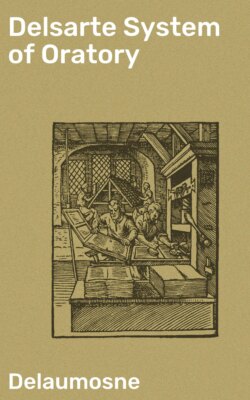Читать книгу Delsarte System of Oratory - Delaumosne - Страница 20
На сайте Литреса книга снята с продажи.
Inflections.
ОглавлениеTheir importance.--Sound, we have said, is the language of man in the sensitive state. We call inflections the modifications which affect the voice in rendering the emotions of the senses. The tones of the voice must vary with the sensations, each of which should have its note. Of what use to man would be a phonetic apparatus always rendering the same sound? Delivery is a sort of music whose excellence consists in a variety of tones which rise or fall according to the things they have to express. Beautiful but uniform voices resemble fine bells whose tone is sweet and clear, full and agreeable, but which are, after all, bells, signifying nothing, devoid of harmony and consequently without variety. To employ always the same action and the same tone of voice, is like giving the same remedy for all diseases. "Ennui was born one day from monotony," says the fable.
Man has received from God the privilege of revealing the inmost affections of his being through the thousand inflections of his voice. Man's least impressions are conveyed by signs which reveal harmony, and which are not the products of chance. A sovereign wisdom governs these signs.
With the infant in its cradle the signs of sensibility are broken cries. Their acuteness, their ascending form, indicate the weakness, and physical sorrow of man. When the child recognizes the tender cares of its mother, its voice becomes less shrill and broken; its tones have a less acute range, and are more poised and even. The larynx, which is very impressionable and the thermometer of the sensitive life, becomes modified, and produces sounds and inflections in perfect unison with the sentiments they convey.
All this, which man expresses in an imitative fashion, is numbered, weighed and measured, and forms an admirable harmony. This language through the larynx is universal, and common to all sensitive beings. It is universal with animals as with man. Animals give the identical sounds in similar positions.
The infant, delighted at being mounted on a table, and calling his mother to admire him, rises to the fourth note of the scale. If his delight becomes more lively, to the sixth; if the mother is less pleased than he would have her, he ascends to the third minor to express his displeasure. Quietude is expressed by the fourth note.
Every situation has its interval, its corresponding inflection, its corresponding note: this is a mathematical language.
Why this magnificent concert God has arranged in our midst if it has no auditors? If God had made us only intelligent beings, he would have given us speech alone and without inflections. Let us further illustrate the rôle of inflection.
A father receives a picture from his daughter. He expresses his gratitude by a falling inflection: "Ah well! the dear child." The picture comes from a stranger whom he does not know as a painter; he will say, "Well now! why does he send me this?" raising his voice.
If he does not know from whom the picture comes, his voice will neither rise nor fall; he will say, "Well! well! well!"
Let us suppose that his daughter is the painter. She has executed a masterpiece. Astonished at the charm of this work and at the same time grateful, his voice will have both inflections.
If surprise predominates over love the rising inflection will predominate. If love and surprise are equal, he will simply say, "Well now!"
Kan in Chinese signifies at the same time the roof of a house, a cellar, well, chamber, bed--the inflection alone determines the meaning. Roof is expressed by the falling, cellar by the rising inflection. The Chinese note accurately the depth and acuteness of sound, its intervals and its intensity.
We can say: "It is pretty, this little dog!" in 675 different ways. Some one would do it harm. We say: "This little dog is pretty, do not harm it!" "It is pretty because it is so little." If it is a mischievous or vicious dog, we use pretty in an ironical sense. "This dog has bitten my hand. It is a pretty dog indeed!" etc.
